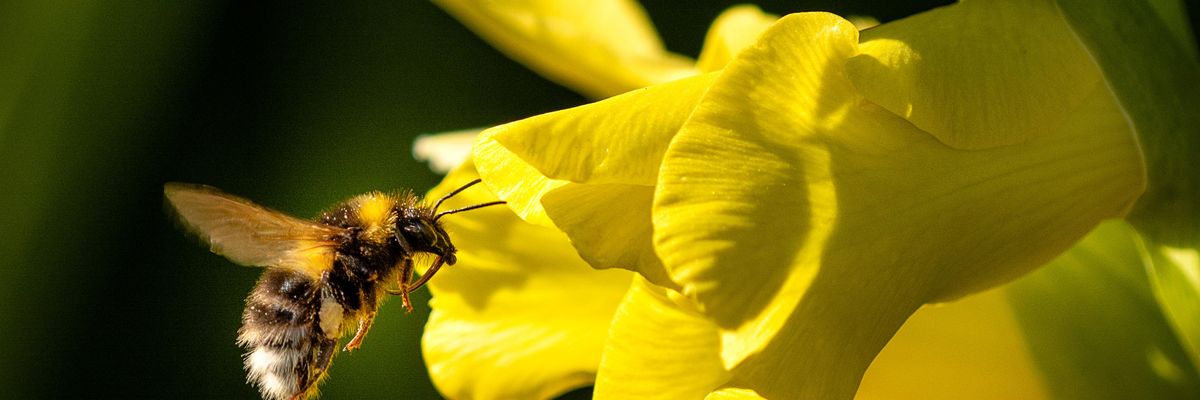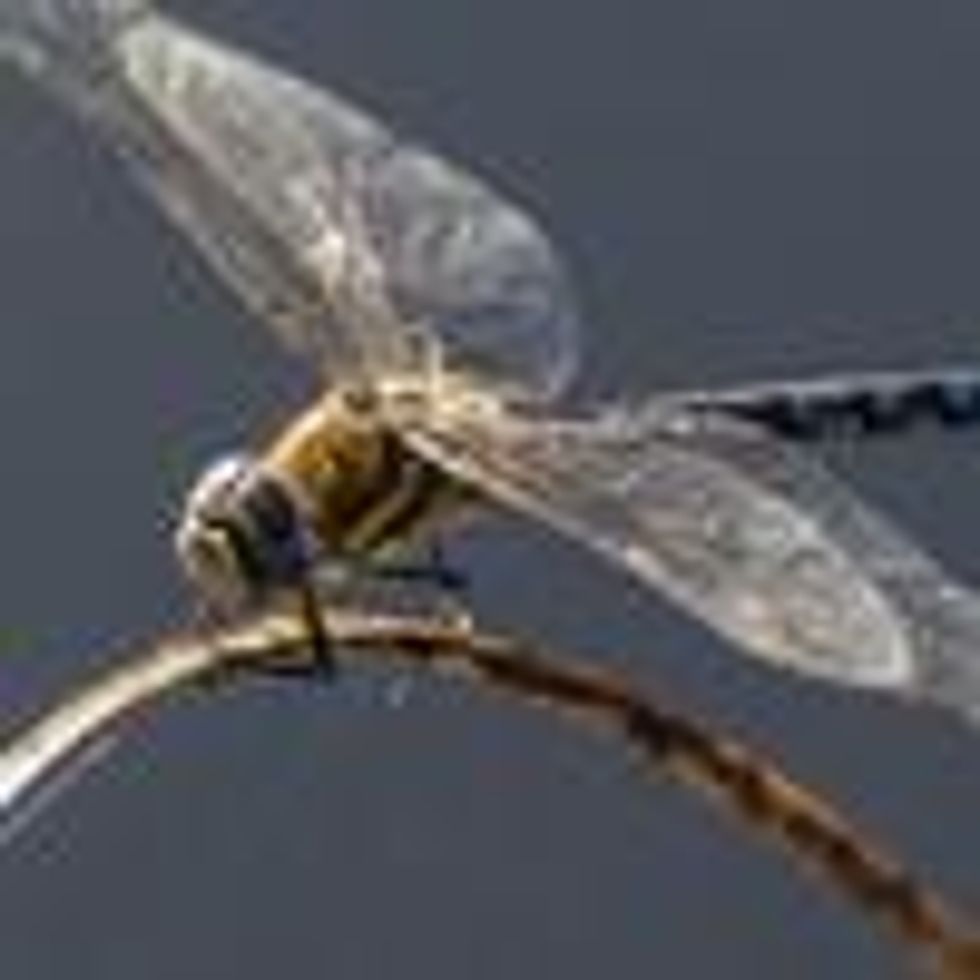

SUBSCRIBE TO OUR FREE NEWSLETTER
Daily news & progressive opinion—funded by the people, not the corporations—delivered straight to your inbox.
5
#000000
#FFFFFF
To donate by check, phone, or other method, see our More Ways to Give page.


Daily news & progressive opinion—funded by the people, not the corporations—delivered straight to your inbox.

A bumblebee in flight checks out a daffodil in Ecclefechan, Scotland in this August 9, 2018 photo. (Photo: James Johnstone/flickr/CC BY 2.0)
A survey published this week analyzing bug splat on U.K. motorists' license plates found that the nation's flying insect population has declined by nearly 60% over the past 17 years, indicating a "terrifying" loss of biodiversity among the planet's most numerous class of species.
"Declines are happening at an alarming rate and without concerted action to address them we face a stark future."
"There is a growing amount of evidence of widespread insect population decline. These declines could have catastrophic impacts on the Earth's natural environment and our ability to survive on the planet," warns a summary of the Bugs Matter Citizen Science Survey, which was conducted by Buglife and the Kent Wildlife Trust (KWT).
"However, there has not been enough data to draw robust conclusions about trends in insect populations in the U.K., because standardized surveys are not used for all insect groups or at a national scale," the publication continues. "Our study demonstrates the use of an innovative method for widespread monitoring of insect 'splat rate' to investigate changes in insect populations in the U.K. over a 17-year timeframe."
\u201cThis should absolutely terrify us all - we have to stop pushing wildlife to the very edges of our spaces & drive not only the protection but the restoration of nature at scale now\u201d— PaulHadaway (@PaulHadaway) 1651745104
To collect survey data, U.K. drivers cleaned their front license plates before setting out on essential journeys. After trips, they counted the number of insects on the plate using a "splatometer grill" before submitting photos and count information via the Bugs Matter app.
The data showed the overall number of insects recorded had declined by 58.5% nationwide. England suffered the greatest loss, with 65% fewer insects recorded in 2021 than in 2004, while Wales had 55% fewer, and Scotland saw a decline of 27.9%.
"This vital study suggests that the number of flying insects is declining by an average of 34% per decade--this is terrifying," Buglife CEO Matt Shardlow told The Guardian. "We cannot put off action any longer, for the health and well-being of future generations this demands a political and societal response. It is essential that we halt biodiversity decline now."
According to a 2020 British parliamentary report that noted a 38% to 75% loss in bug biomass throughout Europe: "Insects play a pivotal role in natural processes that support other living organisms, and human health and well-being. Roles include pollination, pest and weed regulation, decomposition, nutrient cycling, and provision of food for wildlife and humans."
KWT conservation director Paul Hadaway told the BBC Thursday that "declines are happening at an alarming rate and without concerted action to address them we face a stark future."
The U.K. survey's findings complement those of other studies conducted around the world.
Related Content

Last month, researchers at University College London's Center for Biodiversity and Environment Research published one of the largest-ever assessments of global insect population loss, with the paper revealing that "farmland in climate-stressed areas where most nearby natural habitat has been removed has lost 63% of its insects, on average."
In 2020, 73 international scientists published a roadmap to battle that's been called the global "bugpocalypse." The researchers stressed the need to aggressively curb planet-heating greenhouse emissions, reduce use of synthetic pesticides and fertilizers, limit pollution of all types, and fund increased conservation efforts.
Dear Common Dreams reader, The U.S. is on a fast track to authoritarianism like nothing I've ever seen. Meanwhile, corporate news outlets are utterly capitulating to Trump, twisting their coverage to avoid drawing his ire while lining up to stuff cash in his pockets. That's why I believe that Common Dreams is doing the best and most consequential reporting that we've ever done. Our small but mighty team is a progressive reporting powerhouse, covering the news every day that the corporate media never will. Our mission has always been simple: To inform. To inspire. And to ignite change for the common good. Now here's the key piece that I want all our readers to understand: None of this would be possible without your financial support. That's not just some fundraising cliche. It's the absolute and literal truth. We don't accept corporate advertising and never will. We don't have a paywall because we don't think people should be blocked from critical news based on their ability to pay. Everything we do is funded by the donations of readers like you. Will you donate now to help power the nonprofit, independent reporting of Common Dreams? Thank you for being a vital member of our community. Together, we can keep independent journalism alive when it’s needed most. - Craig Brown, Co-founder |
A survey published this week analyzing bug splat on U.K. motorists' license plates found that the nation's flying insect population has declined by nearly 60% over the past 17 years, indicating a "terrifying" loss of biodiversity among the planet's most numerous class of species.
"Declines are happening at an alarming rate and without concerted action to address them we face a stark future."
"There is a growing amount of evidence of widespread insect population decline. These declines could have catastrophic impacts on the Earth's natural environment and our ability to survive on the planet," warns a summary of the Bugs Matter Citizen Science Survey, which was conducted by Buglife and the Kent Wildlife Trust (KWT).
"However, there has not been enough data to draw robust conclusions about trends in insect populations in the U.K., because standardized surveys are not used for all insect groups or at a national scale," the publication continues. "Our study demonstrates the use of an innovative method for widespread monitoring of insect 'splat rate' to investigate changes in insect populations in the U.K. over a 17-year timeframe."
\u201cThis should absolutely terrify us all - we have to stop pushing wildlife to the very edges of our spaces & drive not only the protection but the restoration of nature at scale now\u201d— PaulHadaway (@PaulHadaway) 1651745104
To collect survey data, U.K. drivers cleaned their front license plates before setting out on essential journeys. After trips, they counted the number of insects on the plate using a "splatometer grill" before submitting photos and count information via the Bugs Matter app.
The data showed the overall number of insects recorded had declined by 58.5% nationwide. England suffered the greatest loss, with 65% fewer insects recorded in 2021 than in 2004, while Wales had 55% fewer, and Scotland saw a decline of 27.9%.
"This vital study suggests that the number of flying insects is declining by an average of 34% per decade--this is terrifying," Buglife CEO Matt Shardlow told The Guardian. "We cannot put off action any longer, for the health and well-being of future generations this demands a political and societal response. It is essential that we halt biodiversity decline now."
According to a 2020 British parliamentary report that noted a 38% to 75% loss in bug biomass throughout Europe: "Insects play a pivotal role in natural processes that support other living organisms, and human health and well-being. Roles include pollination, pest and weed regulation, decomposition, nutrient cycling, and provision of food for wildlife and humans."
KWT conservation director Paul Hadaway told the BBC Thursday that "declines are happening at an alarming rate and without concerted action to address them we face a stark future."
The U.K. survey's findings complement those of other studies conducted around the world.
Related Content

Last month, researchers at University College London's Center for Biodiversity and Environment Research published one of the largest-ever assessments of global insect population loss, with the paper revealing that "farmland in climate-stressed areas where most nearby natural habitat has been removed has lost 63% of its insects, on average."
In 2020, 73 international scientists published a roadmap to battle that's been called the global "bugpocalypse." The researchers stressed the need to aggressively curb planet-heating greenhouse emissions, reduce use of synthetic pesticides and fertilizers, limit pollution of all types, and fund increased conservation efforts.
A survey published this week analyzing bug splat on U.K. motorists' license plates found that the nation's flying insect population has declined by nearly 60% over the past 17 years, indicating a "terrifying" loss of biodiversity among the planet's most numerous class of species.
"Declines are happening at an alarming rate and without concerted action to address them we face a stark future."
"There is a growing amount of evidence of widespread insect population decline. These declines could have catastrophic impacts on the Earth's natural environment and our ability to survive on the planet," warns a summary of the Bugs Matter Citizen Science Survey, which was conducted by Buglife and the Kent Wildlife Trust (KWT).
"However, there has not been enough data to draw robust conclusions about trends in insect populations in the U.K., because standardized surveys are not used for all insect groups or at a national scale," the publication continues. "Our study demonstrates the use of an innovative method for widespread monitoring of insect 'splat rate' to investigate changes in insect populations in the U.K. over a 17-year timeframe."
\u201cThis should absolutely terrify us all - we have to stop pushing wildlife to the very edges of our spaces & drive not only the protection but the restoration of nature at scale now\u201d— PaulHadaway (@PaulHadaway) 1651745104
To collect survey data, U.K. drivers cleaned their front license plates before setting out on essential journeys. After trips, they counted the number of insects on the plate using a "splatometer grill" before submitting photos and count information via the Bugs Matter app.
The data showed the overall number of insects recorded had declined by 58.5% nationwide. England suffered the greatest loss, with 65% fewer insects recorded in 2021 than in 2004, while Wales had 55% fewer, and Scotland saw a decline of 27.9%.
"This vital study suggests that the number of flying insects is declining by an average of 34% per decade--this is terrifying," Buglife CEO Matt Shardlow told The Guardian. "We cannot put off action any longer, for the health and well-being of future generations this demands a political and societal response. It is essential that we halt biodiversity decline now."
According to a 2020 British parliamentary report that noted a 38% to 75% loss in bug biomass throughout Europe: "Insects play a pivotal role in natural processes that support other living organisms, and human health and well-being. Roles include pollination, pest and weed regulation, decomposition, nutrient cycling, and provision of food for wildlife and humans."
KWT conservation director Paul Hadaway told the BBC Thursday that "declines are happening at an alarming rate and without concerted action to address them we face a stark future."
The U.K. survey's findings complement those of other studies conducted around the world.
Related Content

Last month, researchers at University College London's Center for Biodiversity and Environment Research published one of the largest-ever assessments of global insect population loss, with the paper revealing that "farmland in climate-stressed areas where most nearby natural habitat has been removed has lost 63% of its insects, on average."
In 2020, 73 international scientists published a roadmap to battle that's been called the global "bugpocalypse." The researchers stressed the need to aggressively curb planet-heating greenhouse emissions, reduce use of synthetic pesticides and fertilizers, limit pollution of all types, and fund increased conservation efforts.